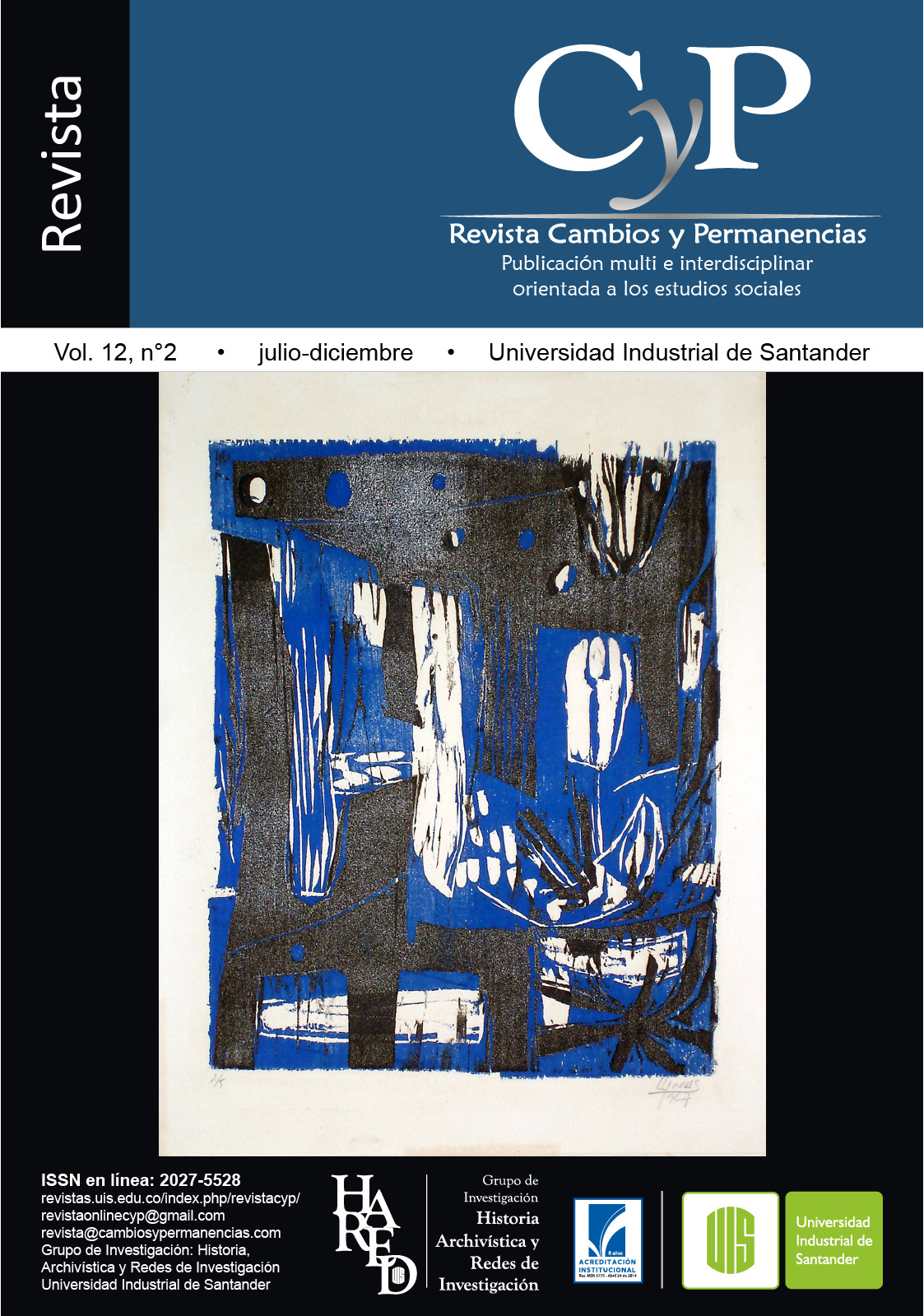Virtual ethnography in times of pandemic: a qualitative methodological design for the understanding of ethnographic stories about subjectivity and the collection of experiences in virtual education for students of HEIs
Published 2021-12-13
Keywords
- Subjectivity,
- Virtual education,
- Learning,
- Virtual ethnography,
- Covid-19
How to Cite
Copyright (c) 2021 Revista Cambios y Permanencias

This work is licensed under a Creative Commons Attribution 4.0 International License.
Abstract
Considering the changes that the current health situation caused by Covid-19 has brought with it in the face of processes in the educational field, generating an inevitable transfer of presence to virtuality to give continuity to activities and thus avoid the spread of disease due to contagion. A methodological design is propose from virtual ethnography, focused on the observation, description and interpretation of the dynamics of the classroom, whose main objective will be to understand the stories constructed by the subjects. Understood the subjects as social agents, from their place of enunciation, contextual and experiential in this space without detaching from their subjectivity; attending to the forms that the dynamics of teaching and learning have adopted in this new reality in which education has been primarily mediated by technology.
Likewise, it is intend that the development of this work can generate valuable inputs for those students of higher education institutions (HEI) who wish to undertake the realization of an ethnographic design with a virtual approach in educational contexts; thus avoiding becoming a procedure manual or a unique model to follow. Carrying out this type of ethnography represents the opportunity to sharpen the senses to understand those various experiences that will influence the development of the student. An invitation, to think about education, as well as the teaching and learning processes within this context of multiple eventualities and technological mediations.
Finally, it is conclude that this type of methodology is not a replacement for "conventional ethnography". Rather acts or presents itself, to virtuality, as one more field that requires attention to capture its own forms, paths and structures; with which it is invite to consider even more the opportunities and potential of this type of exercise, especially in this emerging context. Likewise, it is established feasible and pertinent to undertake a virtual ethnography project in times of pandemic within the framework of virtual education; hence the methodology that is developed in this article, which attends to an ongoing investigation.
Downloads
References
- Referencias bibliográficas
- Acaso, M. (2018). Pedagogías invisibles: El espacio del aula como discurso. España: Los libros de La Catarata.
- Acosta, N., y Guevara, S. (2017). Una reflexión duo-etnográfica sobre nuestra práctica docente en la enseñanza del inglés en básica primaria. Bogotá, Colombia: Universidad de Los Andes.
- Ardèvol, E., Bertrán, M., Callén, B., y Pérez, C. (2003). Etnografía virtualizada: la observación participante y la entrevista semiestructurada en línea. Athenea Digital. Revista de pensamiento e investigación social, (3), 1-21.
- Argüello, A., y Mondragón, U. (2012). Educación crítica y comunidades de aprendizaje. Una experiencia investigativa en Educación Básica. Bucaramanga, Colombia: Universidad Santo Tomás.
- Bárcenas Barajas, K., y Preza Carreño, N. (2019). Desafíos de la etnografía digital en el trabajo de campo onlife. Virtualis, 10(18), 134-151.
- Barela, L., Miguez, M., y García Conde, L. (2009). Algunos apuntes sobre historia oral y cómo abordarla. Buenos Aires, Argentina: Dirección General Patrimonio e Instituto Histórico.
- Biskupovic, C., y Brinck Pinsent, G. (2018). La etnografía frente a los desafíos actuales de las ciencias sociales. Temas sociológicos, 9-31.
- Bruner, J. (1986). Realidad mental y mundos posibles. Los actos de la imaginación que dan sentido a la experiencia. Barcelona, España: Gedisa.
- Camarena, E. (2018). En el principio era el verbo to be… una mirada etnográfica al inicio del aprendizaje de inglés. Estudios de Lingüística Aplicada, 36(67), 201-227.
- Cotán, A. (2020). El método etnográfico como construcción de conocimiento: un análisis descriptivo sobre su uso y conceptualización en ciencias sociales. Márgenes. Revista de Educación de la Universidad de Málaga, 83-103.
- García Villegas, M., Espinosa, J. R., Jiménez Ángel, F., y Parra Heredia, J. D. (2013). Separados y desiguales: educación y clases sociales en Colombia. Bogotá, Colombia: Centro de Estudios de Derecho, Justicia y Sociedad, Dejusticia.
- Geertz, C. (1973). Descripción densa: hacia una teoría interpretativa de la cultura. En C. Geertz, La interpretación de las culturas (pp. 19-38). Nueva York, EE: UU: Gedisa. Editorial.
- Giddens, A. (1998). Sociología. Madrid, España: Alianza editorial.
- Gómez Pérez, N., y Motta Vargas, D. (2020). Subjetividad estudiantil: percepciones ante la pandemia COVID- 19 y desafíos de la implementación de la metodología virtual. Cambios y Permanencias, 11(2), 465.495.
- Guber, R. (2001). La etnografía. Método, campo y reflexividad. Bogotá, Colombia: Siglo Veintiuno Editores.
- Hernán García, M., Lineros González, C., y Ruíz Azarola, A. (2021). Cómo adaptar una investigación cualitativa a contextos de confinamiento. Gaceta Sanitaria, 298-301.
- Hine, C. (2000). Etnografía virtual. Barcelona, España: Editorial UOC.
- Larrosa, J. (2016). Experiencia y alteridad en educación. En C. Skliar, J. Larrosa, Experiencia y alteridad en educación (pp. 7-11). Rosario, Argentina: Homo Sapiens Ediciones.
- Létourneau, J. (2009). La caja de herramientas del joven investigador. Guía de iniciación al trabajo intelectual. Medellín, Colombia: La Carreta Editores E.U.
- Martínez, M. (2005). El Método Etnográfico de Investigación. Caracas, Venezuela. Recuperado de https://www.uis.edu.co/webUIS/es/investigacionExtension/comiteEtica/normatividad/documentos/normatividadInvestigacionenSeresHumanos/13_Investigacionetnografica.pdf
- McLaren, P. (1997). Teoría crítica y significado de la esperanza. En H. Giroux, Los profesores como intelectuales. Hacia una pedagogía crítica del aprendizaje. Barcelona, España: Paidós.
- Restrepo, E. (2016). Etnografía: alcances, técnicas y éticas. Bogotá, Colombia: Envión editores.
- Sánchez, W., y Ortiz, P. (2017). La netnografía, un modelo etnográfico en la era digital. Revista Espacios, 38(13).
